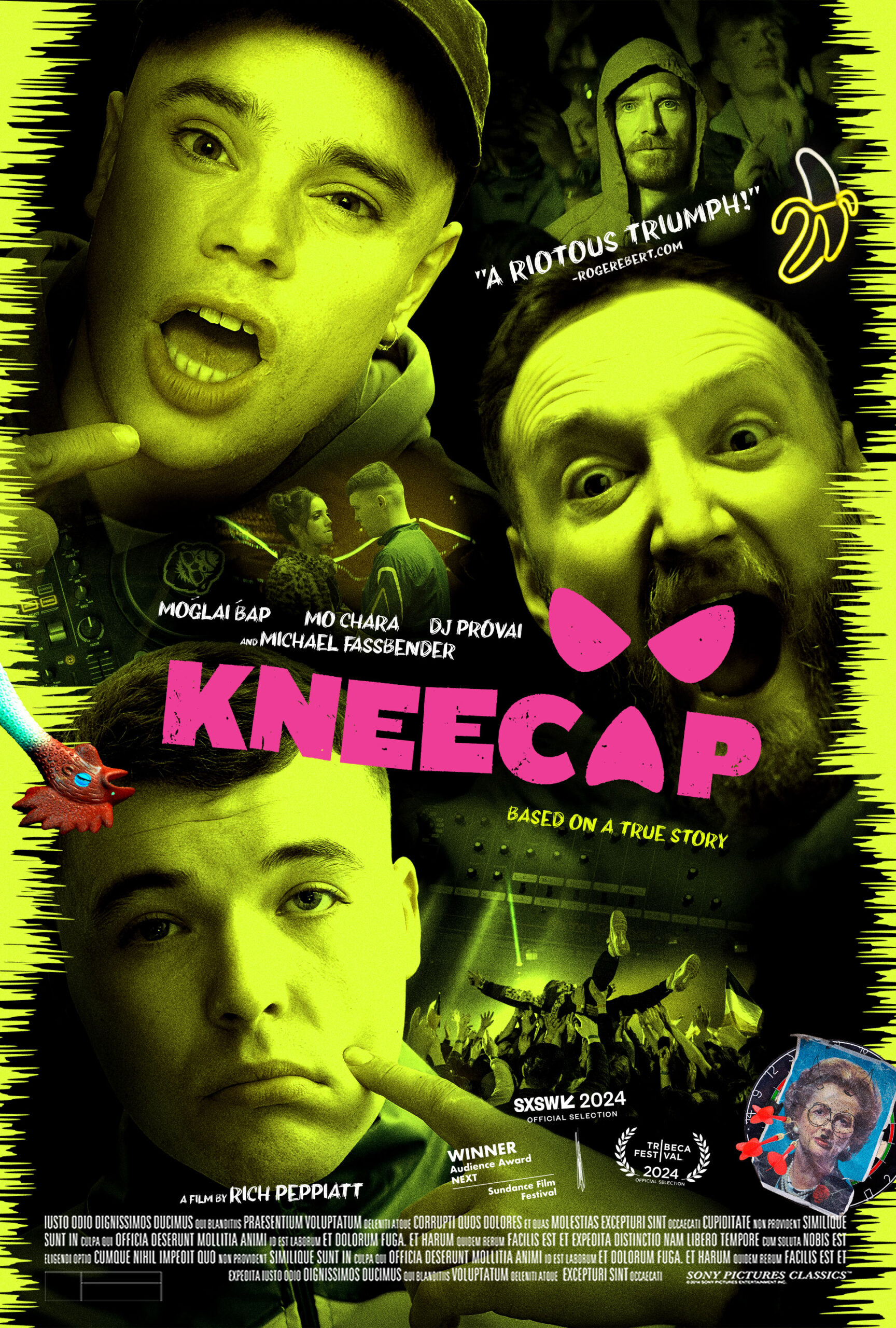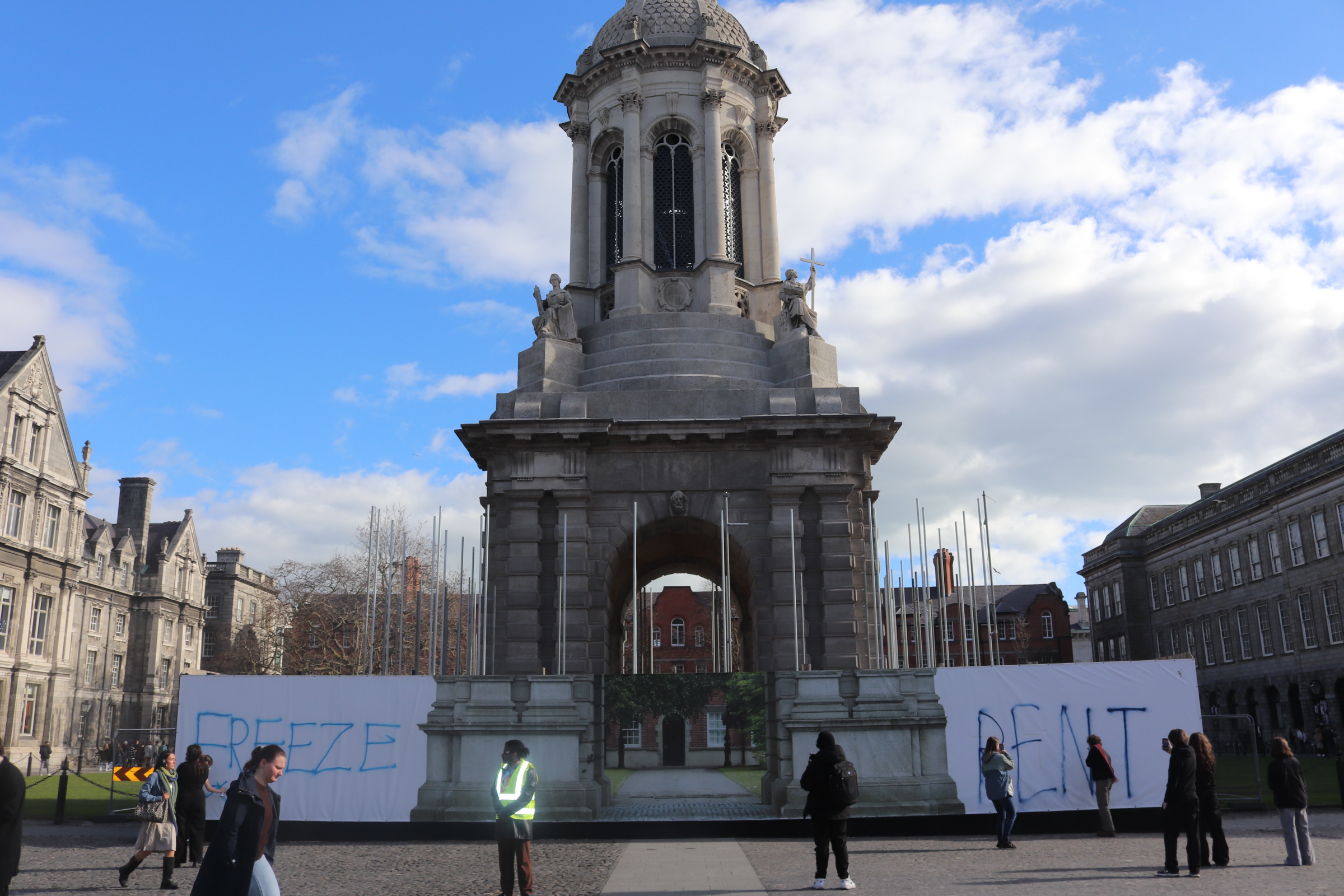
Who are Kneecap? This question has been circling the internet ever since the release of their first single C.E.A.R.T.A back in 2017. They have appeared on our radios, TVs and now, on our cinema screens, while billboards and posters portray their rise to fame. Kneecap have been reigniting the Irish language for the past few years and it has recently come to the forefront.
They are an Irish rap band from Belfast, consisting of trio; Mo Chara, Móglaí Bap and DJ Provaí. The band’s use of the Irish language is one of their unique points when it comes to promoting their music and their film, making them stand out from other artists of this generation. They take these opportunities to reintroduce the language and to gain popularity among newer and older audiences. The use of Irish in their stage names is electrifying and memorable, ‘Mo Chara’, meaning ‘My Friend’, Móglaí Bap, originating from his childhood where he was nicknamed after Mowgli from The Jungle Book and lastly DJ Próvaí. DJ Próvaí comes from the Provisional IRA’s name, the Provisionals, where shortened becomes, the Provos. These unique names incorporate the Irish language into the band’s image, which encourages it to be spoken among newer generations. Their decision to speak Irish in their biopic ‘Kneecap’, 2024, shone a worldwide light on Ireland and our native language, something that is often unknown elsewhere. There has been an outpour of love around their film and it is now Ireland’s official Oscar 2025 entry! The band have now expanded globally, following their debut on ‘The Tonight Show Starring Jimmy Fallon’.
Opinions on the band have altered and significantly changed over the years, since their debut single in 2017. C.E.A.R.T.A, an all-Irish song which discusses themes such as drug-use, sex and violence, a theme across their work. The song was banned by RTÉ’s Raidió na Gaeltachta following its release. The radio station removed the song from their programme’s playlist due to the song’s “drug references and cursing,” says the Belfast Telegraph, something that left over 700 fans furious, and a petition was signed to bring it back on air. It was evident that the song was intended as a satirical observation of life in West Belfast which either RTÉ misunderstood, or perceived as too low-brow for airing. However, their controversies have actually bolstered their popularity over the years, perhaps it was the non-Irish speakers who were unhappy with the song, even though Móglaí Bap has claimed the language is for everyone! The group’s lyricism and image is humorous, outweighing this controversy. As of August 2024, the band has 200k Instagram followers, over 40k TikTok followers and 30k YouTube subscribers, so there have been evident changes since 2017. There has been an outpour of love on their most recent album, titled ‘Fine Art,’ where audiences have been seen chanting their lyrics at sold out concerts and festivals.
The Belfast-born band have become renowned world-wide, especially now following the release of their movie titled ‘Kneecap’ which hit Irish screens this August. Previews for the movie have been shown at local cinemas for the past few weeks in preparation for the anticipated release. The film which manages to merge the Irish and English language into one was shown at the annual Cannes showcase of UK films last May, bringing this extraordinary movie to life. ‘Kneecap’ has resonated with people across Ireland due to the new light it has brought to the Irish language. Kneecap are proud to have spoken Irish in their film and that pride is seen within the community too. They made their film with love for their language, their country and for the community. While it has recently revived Irish speakers around the country, it has also sparked an interest in people abroad to learn the language. Michael Fassbender, who rose to fame for portraying the Irish political activist, Bobby Sands in the 2008 film, Hunger. ‘Kneecap’ has received 96% on Rotten Tomatoes so far, while Variety says that “the feature film… is billed as a raucous anti-establishment comedy”.
In March of this year, Kneecap appeared on ‘The Tonight Show starring Jimmy Fallon,’ performing their new single ‘Sick in the Head.’ The performance was their US TV debut and as of August, the video has 175k views on YouTube. This debut introduced the band to US audiences, while articles by RTÉ, Irish Star and Irish Mirror were written about the group following this debut. However, Kneecap are not shy to talk shows here in Ireland, they appeared on Ireland’s ‘The Late Late Show’ back in February, Caroline Frost from Deadline says, “that they wore Pro-Palestine badges after initially agreeing not to.” They agreed to not wear the badges prior to the show, however, Móglaí Bap informed the late show host that the band wants to “use this platform to appeal to Irish people, to attend rallies and protests… to show solidarity to Palestine.” The trio aim to raise awareness on liberal issues, which was clear here on live TV. There is a certain fearlessness about them amidst a media cycle which has been quite avoidant of the issue. This passion that they have for using their platform to speak on political problems like they did on ‘The Late Late Show’ is a huge contributor to Irish people’s love for the band. Groups have gathered behind the trio in support of their opinions, standing in solidarity with Palestine, amidst this catastrophe.
2024 has been an outstanding year for Kneecap, we watched as the group from West Belfast quickly rose to fame. Kneecap have shifted opinions of the Irish language, where its popularity has also risen. They have surpassed expectations with the making of their biopic, selling out concerts and headlining at festivals across the world. The band have reinvigorated the Irish language to the younger generations with their film and these headlining concerts. It’s interesting to see how their music holds this extent of influence, with their continuous aim to integrate the Irish language into today’s media. We know that this is just the beginning of their rise to fame.






